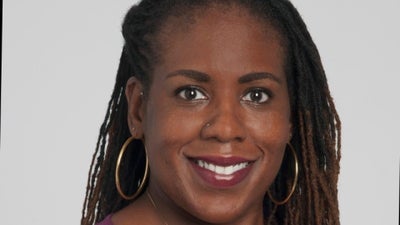
During the height of the coronavirus pandemic, Shamone Gore Panter’s pregnant niece called her to inquire about the COVID-19 vaccine. The expecting mother had heard some misinformation and hoped her aunt, a research scholar at Cleveland Clinic, could allay her concerns.
That call changed the lives of both women. The niece received her vaccine — and Gore Panter reconsidered her career path.
“I thought, ‘This is what I need to be doing every day. I want to go to medical school,'” the 43-year-old from Cleveland told TODAY.com. “I didn’t know where I wanted to go. I just knew I wanted to do it.”
Gore Panter considered entering medical school as early as 2007. However, she felt intimidated by the standardized test known as the Medical College Admission Test, or MCAT. Instead, she went back to school for a doctorate, starting a career as an assistant lecturer at Cleveland State University and conducting cardiovascular genetics research at the Cleveland Clinic.
She told Today.com that she realized over time how crucial it was for Black patients to see Black doctors to address their “justified mistrust” of medicine.
“That could be me,” she says. “I might not be able to solve all the problems, (but) sometimes seeing someone who looks like you gives you at least a foot in the door to maybe try to talk to people and give them information to potentially take better care of their health.”
She took a practice test with the help of a coworker, and with a score above 500, she qualified to take the real MCAT. She was accepted into a three-year program run by Ohio University and the Cleveland Clinic after applying for it.
“It is an intense three years because we do the same thing as everyone else but then with the added stuff on top,” she says. “We get to see patients every week…That part is really invaluable.”
Gore Panter was inspired to pursue a career in family practice because she thinks patients are most open with their primary care physicians. Her conviction was further strengthened by the passing of her sister Shan from heart disease. She hopes to increase Black people’s trust in medicine and give them access to quality care by serving as a family doctor.
Reflecting on returning to medical school in her 40s, she believes it is always possible for people to pursue their dreams.
“It doesn’t matter how old you are. If you’re still alive, you can go try and do it,” Gore Panter says. “That could be a major regret if you don’t even try.”
TOPICS: black excellenceThe post Mom Of Four Who Started Medical School In Her 40s Inspires Others To Follow Dreams appeared first on Essence.
0 Commentaires